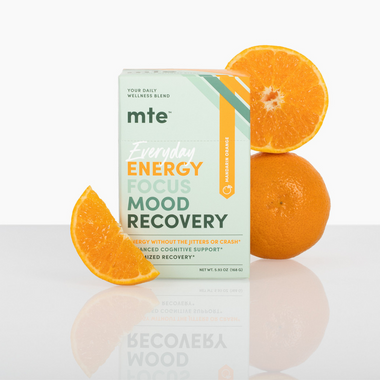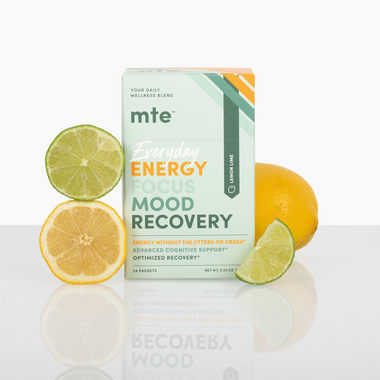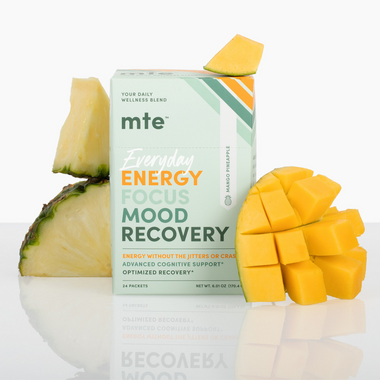
Is Keto Just Another Fad Diet? Busting Myths About Ketones
Keto, ketogenic, ketones – you can’t throw a stone without bumping into a friend, ad or influencer preaching the good word of the keto diet. It’s currently one of the most popular self-managed weight-loss diets out there. The focus on increasing good proteins and healthy fats, coupled with cutting starchy carbs and processed foods, naturally have a positive effect on metabolism, digestion and, in turn, weight. But what do we really know about it?
Think about it – those ketones you’re popping – do you know what they’re doing? Are they necessary? Are they even good for you? As with most fad diets, there’s a mix of truths and myths surrounding ketogenic diets. So let’s unpack the whole situation and then discuss some alternatives that may prove safer and just as effective.
What is Ketosis?
The whole point of a ketogenic diet is to keep your body in a state of ketosis. Ketosis is when all the carbs/glucose in the body has been used up, so your body switches to burning fat for energy instead. When you switch to this metabolic state, your liver produces ketones. Testing your blood’s ketone levels can help you ensure you stay in a state of ketosis.
There are several health benefits to being in a state of ketosis:
- Weight loss: Ketosis can promote weight loss by helping to reduce body fat and water weight.
- Improved blood sugar control: Ketosis can help to improve blood sugar control in people with diabetes.
- Reduced risk of heart disease: Ketosis may reduce the risk of heart disease by lowering cholesterol levels and blood pressure.
- Improved cognitive function: Ketosis may improve cognitive function by increasing the production of ketones, which can be used for energy by the brain.
- Reduced inflammation: Ketosis may reduce inflammation throughout the body.
- Improved gut health: Ketosis may improve gut health by increasing the number of beneficial bacteria in the gut.
Sounds great, right? But that’s not the whole story. We haven’t even gotten into ketones yet.
What is a “Keto Diet”?
Get ready for this divisive fact: there is no such thing as a non-medical ketogenic diet. Truly. When your friends tell you they’ve gone keto, they’re basically just saying they’ve cut carbs, sugars and processed foods in favor of tonnes of healthy fats and fatty proteins. Which is cool. And in fairness, it does need a succinct name.
The point of a keto diet is to get your body into that hard-to-reach state of ketosis we talked about, and to keep it there. When the body’s running on fats instead of sugars, it makes weight loss efforts more efficient, especially when paired with a solid exercise routine.
The Medical Keto Diet
Medically, the ketogenic diet was introduced in the 1920s to treat children with medication-resistant epilepsy. The fat-to-protein ratio was 90/10, meaning for every one gram of protein, you would consume 9 grams of fat. The importance, more than the ratio, is the amount of fat consumed, and carbohydrates are almost completely eliminated.
The medical keto diet has been used to treat:
- Cancer
- Seizures
- Autism
- Diabetes
- Parkinson’s
- Alzheimer’s
Diet-Culture Keto
The keto diet the public knows is kind of a diet version of medical keto, if you will. Instead of managing medical conditions, the goal is to lose weight. And while many of the same foods are allowed and disallowed, there are some key differences in composition that make pop culture keto more of a high-fat, cut-out-bad-stuff diet than a true get-your-body-to-run-differently diet:
- Carbohydrate restriction: The fad keto diet typically restricts carbohydrates to less than 50 grams per day, while the medical keto diet restricts carbohydrates to less than 20 grams per day.
- Protein intake: The fad keto diet typically restricts protein intake to .8g/kg body weight per day, while the medical keto diet typically recommends a higher protein intake at 1.2-2g/kg body weight per day.
- Fat intake: The fad keto diet typically recommends fats make up 60-70% of your diet, while the medical keto diet recommends 90%.
- Supervision: The fad keto diet is not typically supervised by a qualified healthcare professional, while the medical keto diet is always supervised by a qualified healthcare professional.
Ketosis is Different from Ketones
There’s a reason the ketogenic diet wasn’t meant to become mainstream – ketones have the potential to mess you up as much as they have the potential to positively affect your health. A true ketogenic diet is meant to treat some very severe chronic illnesses. It’s closely monitored by a doctor because there is such a things as having too many ketones in your blood.
It’s one thing to need to be on this diet for medical reasons, but if you’re just trying to drop a few pounds, the risks you’re volunteering for with too many ketones and not enough carbs include:
- Kidney stones: The body produces more ketones when it is in ketosis, and ketones can crystallize in the kidneys.
- Nutrient deficiencies: The keto diet is low in many important nutrients, such as fiber, vitamins, and minerals.
- Heart problems: The keto diet is high in saturated fat, which can raise cholesterol levels.
- Digestive issues: Keto diets are known to cause constipation and disrupt your microbiome.
Other common side effects include fatigue and headache, most often as symptoms of these listed effects.
What Are Ketone Supplements?
Ketone supplements are basically a cheat code for upping your blood’s ketone levels without actually having to get into ketosis yourself. They’re thought to help keep your body in ketosis in conjunction with, or as an alternative to, following the mainstream ketogenic diet. You’ll find them in capsule, liquid or powder form.
The most well-known name in the ketone supplement business is Pruvit®, a wellness company with a line of powder mix ketone supplements tailored to people’s weight loss goals. The goal of using Pruvit®’s ketone energy powders is to keep your body in ketosis without following the keto diet.
Ketone supplements have the potential to offer the benefits of a keto diet, but they also have great potential to offer the negative side effects, if you consume too much. And the rub there is that only a medical professional can truly determine what that sweet spot is. And – let’s be honest – virtually no one who’s doing keto is talking to their doctor about it.
3 Myths About Ketone Supplements
There are also some misconceptions around ketone supplements that drive the market. Three common myths we hear all the time regarding keto and ketones are:
Myth #1: Ketone supplements help you lose weight.
These compounds are not a magic bullet. If you’re not on a healthy diet and exercise plan (which doesn’t necessarily have to be keto), ketones aren’t going to do much.
Myth #2: Ketone supplements instantly put you into ketosis.
Again – ketone supps – not a magic bullet. The body wants to run on glucose; evolutionarily, running on fat means you’re down to reserves. Survival-wise, that’s a no, so your body is going to do everything to stay out of that state. Getting into ketosis takes time, even if you take ketones.
Myth #3: Ketone supplements can compensate for cheat days.
Something that’s really difficult with ketosis is that there is no such thing as a cheat day – or a way to cheat a cheat day with ketones. You get your body out of that metabolic state and you’re back to square one. And getting back into ketosis can take days to weeks.
Alternatives to Ketones & the Ketogenic Diet
So, we’re talking about a diet and accompanying supplements that require 100% 24/7/365 effort to work. And at the end of the day, the biohacking required in keto is a little insane – Really? We’re going straight for the liver?
Keto might be right for some people, but a lot of us don’t have the luxury of keeping such a regimented diet, exercise and weight loss plan – life can get a little crazy with a family, a farm, a business. There are a few alternatives to the keto diet that also offer sustainable routes to weight loss, with a little more flexibility and a little less blind manipulation of vital organs:
The Mediterranean Diet
Tried and true, this diet focuses on tonnes of veggies, not a lot of meat or dairy, and cutting out fats – except all the good stuff in olive oil. People living in the Mediterranean have longer expected lifespans than we do, in part due to their consumption of whole grains, nuts, beans, veggies, and fruits, and avoidance of processed foods, saturated fats and sugars.
This diet has been linked to stronger bones, better heart health, decreased risk of dementia, breast cancers and diabetes, and longer lifespan.
The Flexitarian Diet
Not dissimilar to the Mediterranean diet, this aptly-named diet mixes vegetarian with the occasional piece of lean meat. That means a focus on whole foods, nutritious grains, superfoods, veggies, no processed foods, bad fats, sugar – you get it.
This diet has been linked to lower blood pressure, improved heart health and lower risk of Alzheimer’s, and is often a bit easier for people to follow than the Mediterranean diet, because it requires less fish and fruit.
The DASH Diet
The Dietary Approach to Stopping Hypertension diet is another effective weight loss method that also protects your heart health. It’s focused on reducing intake of saturated fats, including tropical oils and full-fat dairy products. Instead, you focus on consuming heart-healthy minerals, veggies, grains, lean proteins, and fruits.
Starting to sound a little similar, no? Maybe your diet doesn’t need a trendy name at all… but that’s for another article.
Comparing MTE & Pruvit® for Your Wellness Goals
Just like Pruvit® ketones can aid your ketosis efforts, our first-of-its-kind energy drink powder is a solid alternative to Pruvit® and keto. MTE is an advanced blend of powerful plant-sourced compounds with adaptogenic and nootropic bioactivity. In conjunction with a healthy lifestyle, including a balanced diet and regular exercise, MTE works to balance your body’s systems.
Instead of via the liver, this keto alternative works via the HPA axis to regulate your body’s chemical signaling, which supports the body’s natural energy production, hormone regulation and metabolic function, among other things. As an alternative to Pruvit®, MTE won’t bump you into ketosis, but it may well bump you back into homeostasis, and any dietician will tell you – that’s the real sweet spot of weight loss.
Curious to try something different than keto to support your weight loss goals? Check out our daily energy greens powder and all the good stuff inside it.






